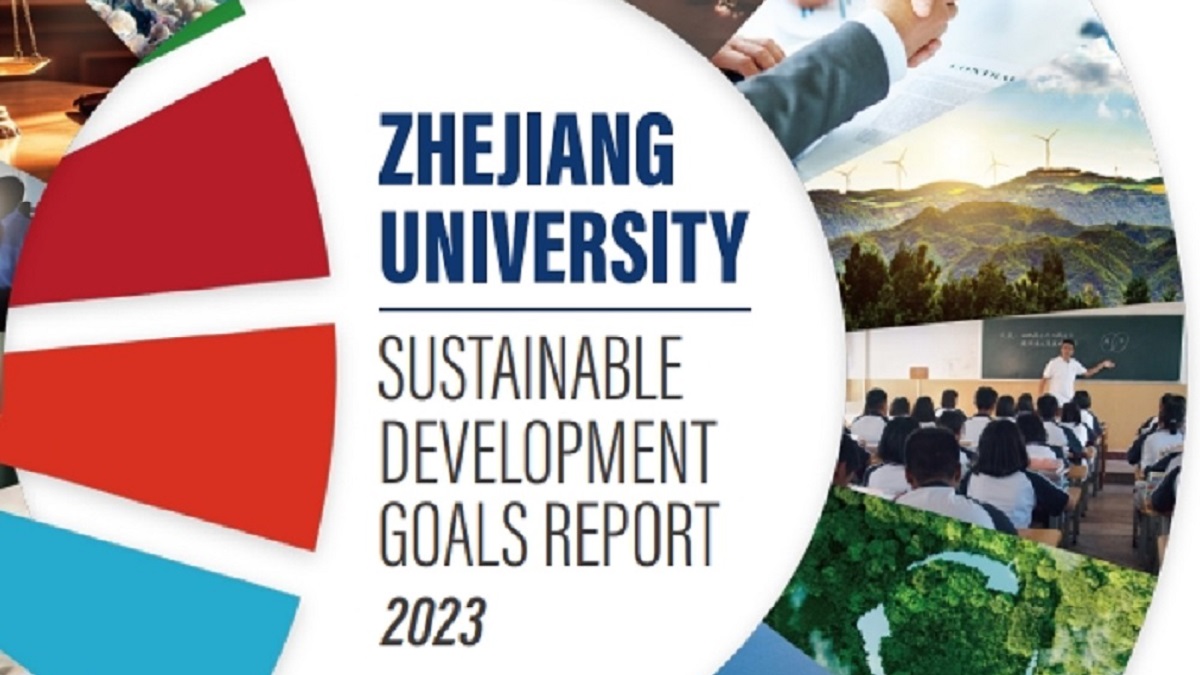HANGZHOU, CHINA – Media OutReach Newswire – 23 January 2024 – Every winter, Davos, a small Swiss town clad in snow and ice, awaits elite representatives from all walks of life worldwide. They gather in the well-known resort for the annual meeting of the World Economic Forum, where the latest economic trends and solutions to global challenges would be discussed.
Zhejiang University released its first-ever SDG report during the annual meeting of the WEF
As the center of knowledge production, the cradle of talent training and the source of innovation, the academia is an important force in the WEF.
From Jan. 15 to 17, leaders from top universities and research institutions around the world met for the Global University Leaders Forum (GULF), a community to address educational, scientific and research agendas to support WEF’s mission of improving the state of the world.
How universities and the private sector can work together to address major global challenges in sustainable development is the theme at the GULF 2024, and for Prof. Jiangfeng DU, President of Zhejiang University and Chair of the Association of University Presidents of China (AUPC), this is an effort that the university he is leading has relentlessly committed to.
According to The Sustainable Development Goals Report 2023 released last July by the United Nations, half of the SDGs were moderately or severely off target, and more than 30 percent of the goals have made no progress or even retreated. There is much to be done to further upgrade research and action to drive sustainable development policies and practices, and Zhejiang University in east China is one of the pioneers.
During the annual meeting of the WEF, Zhejiang University released the Zhejiang University Sustainable Development Goals Report 2023, which is the first time for this renowned Chinese university with more than 120 years of history to introduce its sustainable development policies and practices in an open report.
The report shows the efforts and contributions made by faculty members and students of Zhejiang University in 17 SDGs in 2023.
In 2023, the University held an advanced seminar on anti-poverty issues in developing countries, sharing innovative and effective practices in absolute poverty eradication, rural revitalization and new-type urbanization with officials from 13 countries including Sri Lanka and Uzbekistan.
Last year, Prof. Baojing GU from Zhejiang University won the inaugural Frontiers Planet Prize for his research contribution to mitigating PM2.5 air pollution. Gu is one of the prize’s four recipients and the only Chinese scientist. Meanwhile, Xuehong ZHAO, deputy director of the Nursing Department at the First Affiliated Hospital of Zhejiang University’s School of Medicine, won the Florence Nightingale Medal for the year. This is the honor that nursing staff in Zhejiang Province have received again after a gap of 14 years, and she is also the first nursing staff at Zhejiang University to claim this honor.
Zhejiang University, together with Cambridge University, National University of Singapore, Kyoto University and other universities at home and abroad, has established a number of international alliances focusing on sustainable development, such as the International Digital Equality Alliance and the Sustainable Smart Livable Cities Alliance.
On November 14, 2023, Zhejiang University played host to the third Sino-German Sustainable Development Forum in Berlin, Germany. Featuring in-depth discussions encompassing critical themes such as climate change and governance, technology and sustainability, global health and well-being, the forum sought to explore effective pathways for Sino-German cooperation in promoting sustainable development.
Besides 2023, Zhejiang University have been making contributions to global sustainable development for a long time, with remarkable achievements made in fields like scientific research, talent training and open development.
Sustainable development is a key field of scientific research in Zhejiang University. Over the past five years, Zhejiang University faculty published over 82,500 academic papers covering 17 SDG project areas, with specifically abundant output in SDG3 (Good Health and Well-being), SDG11 (Sustainable Cities and Communities), SDG7 (Affordable and Clean Energy).
In order to cultivate more talents in the field of sustainable development for China and the world, Zhejiang University has strengthened its education in related disciplines, and also held the SDG Global Summer School for two consecutive years.
Focusing on key modules such as carbon neutrality, inclusive development, smart city, data visualization and networked autonomous systems, the summer school attracted the participation of more than 2,000 outstanding young students from over 420 universities in 80-plus countries and regions.
Zhejiang University has also become an active advocate for the sustainable development of university services. In 2021, Zhejiang University rolled out its sustainability action plan–A Global ZJU for Social Good, and launched the Joint Statement of Global University Leaders on the 2030 Agenda for Sustainable Development.
So far, the initiative has received positive responses from over 60 universities from 31 countries and regions, including Harvard University, Yale University, University College London, University of Sydney, University of Toronto, Peking University and other universities from six continents, and many of them have also participated in the GULF.
Among the plethora of sustainable development issues facing the world, global warming is one of the prominent challenges, which directly relates to whether Davos will still be such a snowy fairy-tale place in winter in the near future.
In the past decade, Zhejiang University has generated more than 10,000 research papers related with net-zero emissions, ranking among the best in terms of global academic output. It has established the Institute for Carbon Neutrality, which seeks to build a high-level carbon neutrality sci-tech talent center and a high-tech innovation highland via interdisciplinary integration and collaborative innovation.
“Higher education institutions, as the bank of talent and hub of scientific research, play an essential role in addressing the pressing challenges brought by climate change. Zhejiang University has actively answered the call of the 2030 Agenda for Sustainable Development and the Global Development Initiative, and will continue working with its global partners to address the urgent challenges facing the world,” Du said.
